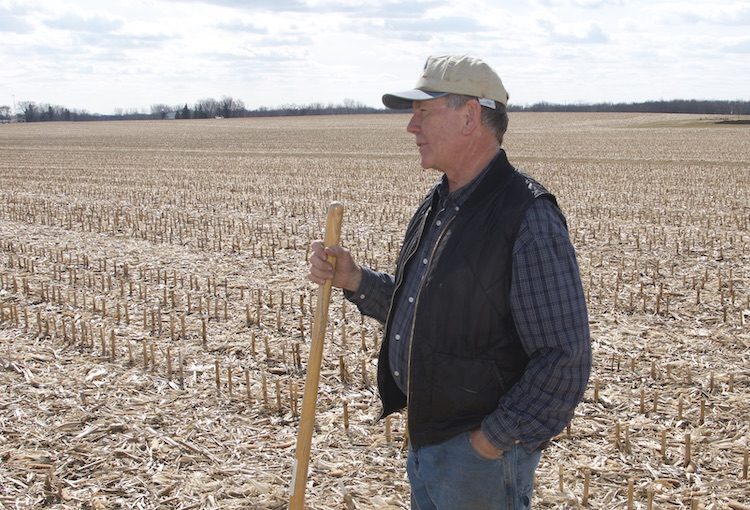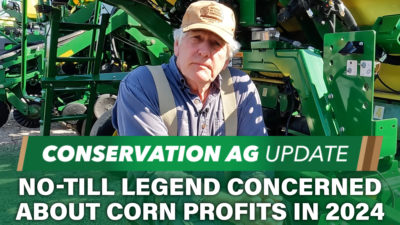For dairy farmer Tony Peirick of Watertown, Wis., the 2020 planting season is moving ahead mostly as usual. He gets up at 6 a.m., has breakfast and then heads out to start his day.
He’s been replacing worn row openers on his planter and swapping out leaky check valves and broken clamps on this manure pump. He’s got his seed, fuel is abundant, and his fertilizer is ordered and expected to be delivered without incident, thanks in part to the agriculture industry being deemed essential.
But actually taking delivery of those clamps and valves was a bit more complicated and time-consuming than he anticipated because the timing of seeking out parts coincided almost exactly with the shuttering of public-facing Wisconsin-area businesses in response to the coronavirus pandemic.
“As farmers, we get used to doing things a certain way,” Peirick says. “Normally when I need things like check valves or clamps, I visit a shop and take the part in to make sure I get the right thing. But this time I had to use the catalog and order by phone.”
When he went to pick up his supplies, he found his order had been left outside for him to pick up as the shop wasn’t allowing customers in the building. Turns out he got the right check vales, but the clamps weren’t quite right and he ended up having to do some welding to get them to work.
“It’s fine, and I understand that shops have to do what they have to do, but that in-person attention at the shops is hard to replace with a phone call,” he says.
Like most everyone else, Peirick’s social life has been impacted, but not so much because he’s stopped going to restaurants and hitting the town. Rather, his schedule opened up because all of the in-person farm meetings and shows were cancelled or transitioned online.
As the chairman of the farmer-led Dodge County Farmers for Healthy Soils and Healthy Waters and an active member of a local watershed group, Peirick usually spends a lot of time in the winter and early spring months attending soil health meetings, planter clinics and other educational events to learn about the latest equipment and practices. He says these are annual events farmers rely on.
Several get-togethers that would have been live events have been redesigned as webinars and Peirick has been pleased at how well those have turned out.
In fact, on April 7 he was the featured speaker in a webinar on planting green that was put on by Wisconsin’s Department of Agriculture, Trade and Consumer Protection (DATCP). Instead of going to the DATCP offices, though, he and Dodge County Land and Water Conservation Technician Jared Winter used Zoom to dial in from Peirick’s farm shop.
Again he notes that doing things a new way isn’t a hardship, but it’s clear he misses the social interaction with his fellow farmers.
As a smaller dairy — he raises about 200 dairy cows — his regular milk pickups have continued every other day as scheduled, though that could change. His milk is processed by the Dairy Farmers of America (DFA), the largest dairy co-op in the country which has in the past week asked some larger dairies to dump their milk instead of bringing it in for processing.
Peirick explains that the dairies that are asked to dump milk still get paid for their product, but everyone who sells to the coop will end up taking lower payments as a result.
There’s no spigot on a dairy that can just be turned off — farmers can’t stop milking their cows — so the ultimate outcome is worrying. Peirick says farmers can adjust the feed which can in turn reduce output. But nevertheless, “we’re looking at about a 30% reduction in prices currently.”
I ask why dairies have to dump milk while there are also stores restricting purchases and he explains that a lot of stores — not to mention processing and bottling facilities — set up their supply chains far in advance and base it on regular yearly anticipated sales.
Shifting production isn’t easily done. Milk that was going to the suddenly closed school systems now has no home. Even if the processing facilities were able to pivot to a different type of packaging, there is no end customer that has been able to absorb the extra product. The infrastructure just isn’t there.
Peirick says the dumped milk is probably mostly going into manure pits and that piques his curiosity. “I wonder what the N, P and K value of that milk is,” he muses.
Corn and soybean prices are another big concern for Peirick. He no-tills both on about 1,100 acres, growing some as feed for his cows but also selling a lot of it into the ethanol market.
With the dramatic reduction of road traffic, fuel consumption — including ethanol — has taken a nosedive. In fact, the local ethanol plant that he sells to has closed down completely for the foreseeable future, not due to Stay at Home Orders or fears of contagion but because there’s currently absolutely no demand for the product.
“I think the plan is for them to reopen in August, but we’ll see,” he says.
Prices of corn, soybeans and milk are all low and Peirick, like farmers in general, isn’t optimistic about them rebounding soon.
“We’ll probably see a lot more dairies dropping out this year,” he says. “If this was happening after good years it would be one thing, but we’ve already had two bad years in a row with low prices. A lot of farmers are hurting.”
Despite all the uncertainty and disruption, Peirick is forging ahead with his cropping plans and keeping in touch with his friends and fellow farmers, albeit online. And at the end of the day he’s looking on the bright side.
“Farmers are lucky that we can keep working. I’d go crazy if I had to sit at home all day.”








Post a comment
Report Abusive Comment